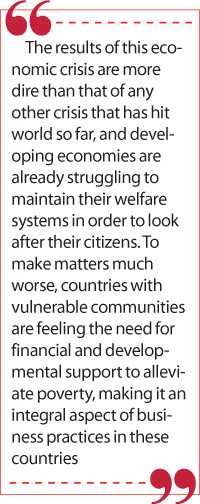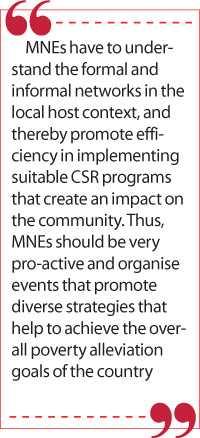Tuesday Feb 24, 2026
Tuesday Feb 24, 2026
Monday, 19 October 2020 00:10 - - {{hitsCtrl.values.hits}}

At a time when local governments are facing difficulties, MNEs that are established in the developing world have a huge responsibility to shoulder. It is evident through research that amidst the more pressing global challenges in the world at present, many corporates have given relatively less priority towards poverty alleviation – Pic by Shehan Gunasekara
The United Nations (UN) in its Sustainable Development Goals (SDG) has included poverty alleviation as a goal, thereby calling national attention towards ending global poverty. It is now a known fact that global poverty and the absolute number of poor in the world are increasing over time, while the COVID-19 pandemic has definitely made matters much worse. 
Currently in 2020, the World Bank has estimated that 9.1% to 9.4% of the world’s population lives on less than $1.90 per day, which is defined as a condition of extreme poverty. To reduce poverty, especially poverty in developing countries, stakeholders, including business firms, have a major role to play and a responsibility towards showing good will towards this project.
Adopting this perspective, the UN sustainable development agenda emphasises the great potential of firms in solving sustainability related issues, including the alleviation of poverty. The agenda also highlights the effective role that could be played by public-private partnerships in solving global poverty-related issues.
COVID-19 brings poverty alleviation into the spotlight
The emergence of the COVID-19 pandemic drew attention to poverty alleviation and has become a critical issue burdening many governments, especially those in developing countries. Decisions to lockdown and discontinuation of major economic activities in many nations have negatively influenced not only the macro level but also the micro level.
Many employees have lost their jobs, and the reduced number of working hours and closing down of businesses has resulted in a decrease in income for people and businesses when compared to the pre-pandemic period.
The International Labour Organisation (ILO) estimates that COVID-19 will make global unemployment worse, resulting in around 23.7 million unemployed workers. Disruptions to international trade have impacted many economies significantly, and the impact has spread across the macro, meso and micro levels.
An international study confirms that more than 80% of companies believe that their organisations will be impacted by COVID-19, especially their supply chain continuation. In other words, suppliers may face difficulty in continuing their production as well as in honouring their contracts.
On the other hand, due to the shrinking of consumer demand and the concomitant loss of income, companies are also facing difficulties in buying products and have started to cut back on supplier contracts. Most developed countries are making sure that the owners of SMEs and the income of employees in the SME sector are ensured protection under the social protection of national systems under COVID-19. However, the capacity of developing economies and their governments are limited with respect to ensuring the protection of the SME sector.
The results of this economic crisis are more dire than that of any other crisis that has hit world so far, and developing economies are already struggling to maintain their welfare systems in order to look after their citizens. To make matters much worse, countries with vulnerable communities are feeling the need for financial and developmental support to alleviate poverty, making it an integral aspect of business practices in these countries.
At a time when local governments are facing difficulties, MNEs that are established in the developing world have a huge responsibility to shoulder. It is evident through research that amidst the more pressing global challenges in the world at present, many corporates have given relatively less priority towards poverty alleviation.
With shorter cash flows, most managers have decided to cut their short term CSR projects to survive in the market. However, corporates such as MNEs cannot escape this huge responsibility as they are important stakeholders of the business ecosystem. MNEs need to focus on Responsible Business Conduct (RBC) more than ever before, and make sure their actions will not create any further risk to the people and the planet.
At a time when public funds are shrinking after the COVID-19 pandemic, the responsibility of corporates related to poverty alleviation efforts is significant. The corporate sector has to be more concerned with ensuring suitable living conditions for and the well-being of its civil societies. They need to play a more active role in their communities and follow progressive models of doing business while eradicating poverty. Unlike SMEs which have been hit very hard during the pandemic, larger and more stable businesses like MNEs have a huge responsibility to support the goal of eradicating poverty under the new normal conditions.
Hence, managers of MNEs now have to include poverty alleviation among already common challenges such as managing market forces, stiff local and international market competition, local and foreign market regulatory frameworks and scarcity of resources. All these challenges are forcing MNE managers to be more socially responsible and accountable in their operations in the host market. However, there do not seem to be any indications of serious projects to end global poverty so far, though poverty alleviation has now become a major global issue.
 Are the CSR programs of big businesses like MNEs enough to alleviate poverty?
Are the CSR programs of big businesses like MNEs enough to alleviate poverty?
MNEs efforts towards alleviating poverty are diverse, but many are still unaware of the significant role they can play in the host country’s economic development. Therefore, it is the right time to question why MNEs give less priority towards poverty alleviation. Is it because they put global warming as the highest priority in their sustainability strategies? Is it because competition of companies to move faster towards sustainability leads to brand development? Or is it because CEOs feel that poverty alleviation is the sole responsibility of governments and policy makers?
While examining the CSR strategies of MNEs in responding to poverty alleviation, it is evident that big corporates rarely follow a pro-active approach, and any convincing long-term focus in corporate strategies addressing poverty alleviation is lacking. Most MNEs around the world still implement CSR programs in a reactive way, rather than addressing the real poverty related issues that exist in the host country.
Also, it has been widely observed that most large corporates direct their CSR programs towards their key stakeholders including customers, employees or shareholders in a way that ensures financial returns in the future. Sadly, very few or no corporates show a true interest in and commitment towards investing in the poor or other marginalised groups in the host country.
MNEs need to consider groups such as migrant workers as research confirms that they are the employee group that has been hardest hit due to COVID-19. Loss of income impacts migrant workers’ quality of food, accommodation and even hygiene. Thus, MNEs can and should direct their focus towards these vulnerable groups and their needs at this moment of crisis.
In the global context, sustainability literature highlights the leading role played by European corporations and their CEOs in successfully addressing poverty related issues in their business strategies. Though these programs are context specific, their objectives and long-term perspectives in setting objectives could help other MNEs and local businesses to develop their own CSR strategies. Such hallmark sustainable business practices should be identified and discussed further by scholars and practitioners in developing countries.
Call for sustainable leadership on the road to poverty alleviation
Research continues to suggest the importance of corporate leaders and their CSR strategies aimed at human development and sustainable development challenges such as poverty. Hence, considering poverty alleviation strategies is essential to an MNE in spite of the fact that it might limit the corporate’s economic performance during this turbulent time.
The need for MNEs to support this enormous task is more important than ever before. Mangers should be proactive in allocating more resources, logistics, skills and innovative approaches to continue business operations during the pandemic.
A study conducted in 2007 using CEOs in Europe has indicated that considerably less importance is given to poverty alleviation compared to other sustainable development goals. Though this study is a comparatively old one, still one can question whether current CEOs are more concerned about poverty alleviation and related issues when developing their strategies.
Leaders of MNEs should be aware about their CSR initiatives when facing disaster, when engaged in continuity and contingency planning during a crisis. It is essential to improve skills to respond to short-term crisis issues while long term recovery is also important. Therefore, senior management should engage in creative and innovative thinking to find alternative solutions for handling sensitive issues such as laying off staff, discontinuation of a supplier, or the divestment of a plant. Hence, the sustainable attitudes, values and behaviours of senior corporate leadership including CEOs is important in driving firms to address poverty alleviation.
When examining a corporate’s efforts towards alleviating poverty, there are a number of poverty related issues that managers in MNEs are attempting to address so far. These include:
There are a number of good practices or best-practices around the world focusing on poverty alleviation. However, there is a lack of meaningful benchmarks, sustainable approaches, measurements and tools to evaluate the performance of CSR programs in this regard. Therefore, this area needs the urgent attention of both scholars and practitioners if major and speedy changes are to occur in this sector.
In the case of MNEs, their country of origin and its view on capitalism have a direct impact on their CSR strategy. The cultural and religious values, the extent to which sustainability aspects are included in the curriculums of the national education system, political and legal orientation towards sustainability and economic development of the host country and orientation towards sustainability of the country of origin also influence MNEs behaviour towards poverty alleviation in the host market.
In the context of MNEs and their efforts towards poverty alleviation, there are diverse approaches taken by different sectors such as the oil and gas industry, the telecommunications industry and the FMCG industry, among others. These diverse groups are using their own approaches that they think are the most suitable to address issues relating to poverty. This confirms that there is no single or individual strategy that can be recommended as the best approach. What we need to facilitate is an industrial dialogue between stakeholders and MNEs and work together more actively, responsibly and responsively towards supporting national agendas aimed at alleviating poverty. MNEs should be encouraged to apply more GRI and other related standards when reporting corporate efforts, especially those focused on alleviating poverty. Industries can design poverty related indicators that firms in those industries can use to set KPIs in their organisations to evaluate the performance of their CSR efforts.
 Benefits for MNE through CSR strategies aiming towards alleviating poverty
Benefits for MNE through CSR strategies aiming towards alleviating poverty
When an MNE adopts any form of CSR, it will be able to improve its long term profits through an increase in the firm’s reputation, brand loyalty, brand values, goodwill of the firm, greater satisfaction of its consumers, ability to attract employees and enhanced organisational commitment. These benefits are also common to CSR efforts directed towards poverty alleviation.
However, a closer examination confirms that most MNEs are only concerned about short-term programs aimed at eradicating poverty, though a few do attempt to develop long term strategies to handle the problem. Short term measures have to be seriously questioned as only the long term commitment of corporates can end poverty in local communities. Adopting an RBC approach to address poverty alleviation issues increases the attraction of the business to its investors, while its supply chains become more resilient and adaptable during crises.
Stakeholder engagement in creating a social dialogue
Among big businesses, MNEs can be identified as only one party that leads national efforts towards poverty alleviation, and hence, stakeholder engagement is crucial to create a positive impact. MNEs should not take the power of the local cultural context for granted as it may destroy cultural or religious harmony or favour one community or group over another, all of which might become sensitive social issues in some local cultures. Such events could generate more negative consequences for MNEs than positive. Therefore, managers should be vigilant in managing stakeholders while planning and implementing such projects.
Linking local community groups and other stakeholders to poverty eradication CSR programs has been widely identified as one of the most effective ways to confirm the achievement of program objectives. In certain instances, engaging local administrators in the program has become an essential step to improving the quality and efficiency of the program.
CSR managers can engage local political and technical support from social institutions such as municipal councils, village leaders and schools as these parties and their sense of belonging to the program will improve its performance while making the program more cost effective as well. Hence, networking and collaborating will have a positive CSR impact while enhancing the economic wellbeing of local communities.
CSR strategies of MNEs aimed at alleviating poverty
An examination of the CSR strategies of MNEs that focus on poverty alleviation confirms that they are diverse, and a few of these corporate efforts are mentioned below.
Challenges faced by MNEs when attempting to alleviate poverty, especially in developing nations
Operating CSR in the host market is quite challenging and sometimes controversial, where the MNEs have to follow and balance the standard rules and business practices of both nations. While balancing the best to both home and host markets, managers of MNEs have to be more sensitive towards context specific needs relating to poverty and to show sincerity towards local community requests.
Maintaining business and professional ethics also become a challenging issue for many MNEs, and this has become a threat to successful implementation and long term continuation of CSR programs in certain developing countries, where corruption and political instability is rife. Here, corporates have to question their CSR strategies, whether they are really looking towards the long term self-reliance of these communities or merely short-term returns.
A true and faithful MNE will always ensure that its local communities are out of poverty and self-reliant when it withdraws from the host market.
This means that MNEs must engage in serious long-term planning with ethical intentions and accountability towards sustainability. An MNE has the capacity to hold all its stakeholders accountable towards the achievement of poverty alleviation and motivate them to carry out the assigned project tasks by creating a sense of belonging and a sense of ownership in the programs. Some of the common challenges that MNEs have to face while implementing CSR for poverty alleviation are;
These diverse challenges faced by the management of MNEs while trying to alleviate poverty confirm the need for adopting different context specific strategies in designing social development and poverty alleviation programs.
Indicators to measure CSR strategies for poverty alleviation
Businesses such as MNEs face challenges in measuring the impacts of their CSR strategies in alleviating poverty. This is because there is a paucity of methods, tools or models to support performance evaluations.
Most MNEs include KPIs in their sustainable strategies to measure performance. However, development in this area is still not very satisfactory. Sustainability consultants and practitioners should pay urgent attention towards developing viable tools that enhance the effective implementation and performance of such programs. Some such examples are;
In addressing this gap, the Organisation for Economic Cooperation and Development and UNCTAD developed a framework to evaluate corporate efforts to eradicate poverty. This framework comprises 20 items under the following categories: Content issues (Equality of opportunity and treatment, working conditions, collective bargaining) and context issues (reflecting local conditions, dynamic comparative advantage, training, monitoring). These factors have to be considered when developing a more practicable and flexible version of the framework to be used by future managers of MNEs.
The way forward
It is now clear how important it is for an MNE to recognise social development as a significant issue in its strategic development process. Companies should consider including poverty alleviation in their short-term continuity planning, while solving cash flow and solvency issues. Including social development as a long-term strategy will confirm MNEs presence in and contribution towards the fight against poverty prevailing in their local communities. This will surely provide advantages to an MNE as it enables it to develop its corporate image and to build greater confidence among its local community and the government of the host country.
An MNE’s agenda linked to localising its image can be greatly facilitated by its engagement with sustainable community development programs. In doing so, MNEs should make sure to include KPIs and measure their long term impact on the community. Companies can adopt the RBC approach and be more strategically oriented whilst making the systems more responsive towards crises. This will ensure that their efforts have contributed to the social well-being and living conditions of the local people.
Mere financial contributions or donations are not effective in many instances, CEOs should attempt to reconfirm their position in the local community by engaging in high-impact sustainable community development projects. At this crucial time of the COVID-19 pandemic and the resulting economic shocks, most MNEs should not concentrate on mere CSR programs in community development; instead, they need to make sure that local community needs are well heard and addressed.
MNEs need to make sure that their existing sources of local supply chain partners are not disrupted and that their livelihoods are not at a risk. MNEs can encourage their staff to work from home and provide extra hygienic protection for them. MNEs should also hold open discussions with trade unions and employee representatives to re-design better working environments under the new normal conditions. Research confirms that laying off staff may actually adversely affect the productivity of the remaining staff.
Ensuring that these progressive steps are in place will definitely strengthen the mental health of the local community and help them avoid poverty. Concern with employees’ health and safety during the pandemic and after the pandemic is vital, and therefore, investing in CSR projects that improve the health and safety of employees and the local community during the pandemic is also a responsibility of such corporates.
MNEs can further invest in projects aimed at education and skills development as it is well known that poverty can be alleviated through education. For example, training its staff and local supply chain members so that they can continue to work effectively under the new normal conditions can increase the confidence and efficiency of local communities.
Companies can redirect their resources and employees into health care and protective product manufacturing which will lead to an increase in product demand. Doing so will not make jobs redundant or cause the shutting down of plant operations in developing countries. Many MNEs in East Asia have already begun to implement these strategies.
MNEs can also design both short term and long term strategies to improve education in the local context in many ways. These include projects in developing vocational and technical skills of students and promoting technical skills training programs for local villagers. To increase the impact of such projects, MNEs can recruit these workers into their supply chain once they complete the relevant courses. Considering virtual operations in the new normal, MNEs can think of new ways of designing and delivering these programs. All these measures will help to increase the employability of the local residents.
On the other hand, MNEs can partner with Ministries of Education and Higher Education of foreign and local countries in order to enhance and share the management, technical and operating skills of young learners in the classroom, especially local people belonging to the most vulnerable groups in the community. Facilitating scholarships and internships are also a few options available. These students can later become educators and trainers in the long-term.
Creating a sense of ownership among locals has now became extremely important. For this purpose, MNEs can actively engage with the poor in formulating, implementing and monitoring poverty alleviation strategies. Of course, MNEs should keep in mind host market rules, regulations, customs and norms, and social structures when deciding who should be chosen to engage in these CSR programs. Choosing the correct stakeholders is hard but will definitely reward the company.
MNEs can protect the human rights of the local community by recruiting participants into such programs. It is vital to recognise their voices in developing corporate strategies. Many local communities are unaware about the protection of their fundamental human rights; hence, MNEs can develop awareness programs to enhance community knowledge about these diverse issues. Of course, challenges are unavoidable in such projects, as managing and encouraging local participants whilst promoting equality in the local context is fraught with complexities.
Conclusion
Sustainable corporate strategies are about to materialise in emerging economies. Since MNEs are large players in local business ecosystems, they have greater financial and physical capacity, responsibility and accountability to alleviate poverty in the host country. To attract the best MNEs, governments of developing countries should encourage and be more open towards welcoming MNE participation in poverty alleviation programs.
Understanding and exploring government poverty alleviation policies could, in turn, benefit MNEs in developing a localised CSR strategy towards such poverty alleviation. MNEs should be well aware of the power of the government of the host market and should try to maintain strong relationships with the government and other social stakeholders. By doing so, MNEs will face less threats from key host market stakeholders whilst alleviating poverty. MNEs should also re-examine how far their CSR strategies really improve the quality of life of the poor in the host market community.
National and local governments should encourage more transparency and a corruption-free environment that facilitate a broad discussion of issues relating to poverty with the collaboration of private-public partnerships. MNEs can take either leading or supporting roles together with the government or act as leaders, mediators or a facilitators in host market economic development.
Thinking of creating a positive impact in the long term should become a priority in an MNE’s sustainable strategies rather than looking for mere short term economic results. However, there is a lack of measurement tools in practice to confirm effective administration, and hence, more focus should be given to identifying the best sustainable business cases that practitioners can use in the future.
To sum up, responsibility for alleviating poverty should not be placed solely on the shoulders of MNEs, but has to involve all stakeholders. Stakeholders in the local community have in-depth understanding of the real requirements, burning issues related to poverty, CSR approaches and strategies that would work best in the relevant context.
MNEs have to understand the formal and informal networks in the local host context, and thereby promote efficiency in implementing suitable CSR programs that create an impact on the community. Thus, MNEs should be very pro-active and organise events that promote diverse strategies that help to achieve the overall poverty alleviation goals of the country. They can follow the RBC approach in addressing sustainability issues to ensure that the company is making a long term positive impact on its people, on the planet and on its supply chains. Consequently, local citizens will perceive MNEs not as foreign entities working entirely for profit but as inclusively social institutions that act as stewards in the society they operate in.
(The writer is attached to the Department of Commerce, Faculty of Management Studies and Commerce, University of Sri Jayewardenepura, Sri Lanka)